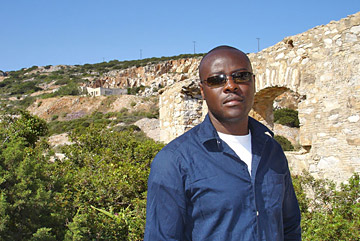We regret the passing, on April 11, 2024, of the distinguished Romanian author and critic Dan Cristea, who served as the editor in chief of the Luceafărul de Dimineață cultural monthly. In addition to being an alum of the 1985 Fall Residency, Cristea received his PhD in Comparative Literature at the University of Iowa.

Helon Habila (Nigeria/US, b. 1967) was educated at the University of Jos, Nigeria, and the University of East Anglia, UK. His first novel, Waiting for an Angel came out in 2003 and received the Commonwealth Writers’ Prize for Best First Book (Africa Region); it is presently being made into a movie. Habila's most recent novel, Measuring Time (2007), was awarded the 2008 Virginia Library Foundation's fiction award. Habila was the first African Writing Fellow at the University of East Anglia, from 2002 to 2004, and then the Chinua Achebe Fellow in Global Africana Studies at Bard College, New York, 2005/2006. He is a contributing editor to the Virginia Quarterly Review and a columnist for the Nigerian newspaper, NEXT (234next.com). Currently Habila teaches creative writing at George Mason University in Fairfax, Virginia, USA. His website is: helonhabila.com
IWP: What or whom do you read to recharge your writerly batteries?
HH: I like reading the review pages of the Guardian and the TLS and the New Yorker. I keep up to date with what other writers are doing. Of course I also read novels, but this is what I do all the time anyway since I teach creative writing.
IWP: What personal characteristic do you care most about in your life as a writer?
HH: Writing gives me focus and purpose. When I am writing nothing else matters. I like that intensity, that absolute absorption, I can only be that way when I am writing.
IWP: After all this time, is there something about your first stay in Iowa City that has remained particularly memorable?
HH: It was a magical moment, I guess. A special memory. I met incredibly nice people, some of whom I am still in touch with. And the Iowa river...it still flows in my mind. But it is the people I still remember.
IWP: Is there music that complements or stimulates your writing?
HH: The Blues, Billie Holiday in particular. Also, Robert Johnson.
They create a sense of calm in me.
IWP: What are you working on right now?
HH: I am working on about two or three things at once. I just finished a first draft of my third novel, and I am also working on a non-fiction book on Lagos for Granta. I am also co-editing an anthology of African short stories, again for Granta.
IWP: What are the effects of the many digital and web-based literary activities in your region/language/literary circuits? Are you interested in, or affected by, these changes in the texture of language and modes of writing?
HH: There are usually two responses to web-based technology, one is to regard it as some sort of newfangled nuisance and pretend it is not there and go on plodding in the old way(I know some people who still don't have email addresses) or to embrace it and use its many opportunities for ones end. Once you do the latter you will be surprised by the incredible amount of resources available on the net. I use it but I don't let it influence me overtly. I don't feel I have to blog on my website for instance. On the other hand, I do have a website which I designed myself - very basic, but I did it myself.
IWP: What writers, or what works, are in your opinion in need of more translation and attention? What literary neighborhood excites you at the present moment?
HH: Definitely Latin-American and Francophone-African fiction. There's a lot of new work coming out rendered inaccessible because of the language barrier. One has to wait ages for a translation, and hope that it will be good when it does come out. I mention the Latin Americans in particular because they inhabit a very similar socio-cultural space with Africans that reading their fiction enlarges my conception if what is possible. From the magical realist work of the Marquez generation to the present post-nationalist books of Bolano - they grapple with basically the same things we are grappling with in our writing.
IWP: From your vantage point, should the state be involved in supporting literary creativity or literary institutions, and if so, in what ways?
HH: Literature enriches the culture, and anything that enriches the culture usually does have some beneficial socio-political effect, and the government should encourage that. Throughout the ages it has always been so, good art, which is often non-commercial in nature, must have patronage to survive. The government should see itself as the patron.
IWP: What—if anything—has given you a cause for political optimism in the last decade?
HH: That is simple: Obama.
Find Us Online